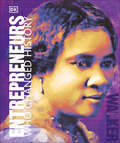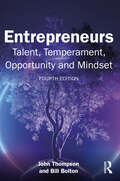- Table View
- List View
Entrepreneurial Universities
by Marta Peris-Ortiz José M. Merigó-Lindahl Carlos Rueda-Armengot Jaime Alonso GómezThis book analyses the importance of the entrepreneurial university, specifically in relation to the creation of entrepreneurial ideas and attitudes in students and entrepreneurial initiatives in academic institutions. The aim of the editors and contributing authors is to provide the reader with a set of experiences illustrating the advantages of communicating and encouraging entrepreneurship among students, thereby highlighting the "third mission" of the university: the need to adopt entrepreneurial strategy without disrupting the quality of teaching and research. Featuring initiatives from institutions around the world, the authors argue that the increasing importance of knowledge in the technical and social dimensions of today's world provides greater relevance to the entrepreneurial university. In this context, universities transcend their traditional focus on teaching and basic research to carry out technology transfers, marketing ideas, and patent registrations, and incorporate spin-off companies that contribute to industrial innovations, economic growth, and job creation. In the teaching dimension, the entrepreneurial university represents a focus on programs which train students in the applications and most advanced practices in knowledge-driven fields. The book addresses such questions as: Can marketing ideas deteriorate the quality of research in the long term? What importance does the cultural framework have for an entrepreneurial education? What circumstances and programs facilitate spin-offs in universities What are the key features of entrepreneurial universities? In reference to entrepreneurship education in its broadest sense, then, it corresponds to the framework of ideas and general features on which entrepreneurship is founded: in-depth knowledge of the projects or ventures which they wish to carry out, capacity to perceive the relevant characteristics of the environment, and the leadership and goal setting skills to achieve success.
Entrepreneurial Universities: Creating Institutional Innovation in Times of Turbulence
by Surja Datta Sola AdesolaThis book explores the idea of the ‘Entrepreneurial University’ within the institutional environment that focuses on the production, dissemination, and exploitation of knowledge. Keeping its gaze firmly on the constitutive elements of the knowledge-based institutional environment – the key actors and their interactions – the book makes important theoretical and empirical contributions to the burgeoning literature on academic entrepreneurship. The contributing chapters in the book draw insights from a range of disciplines including history, institutional and evolutionary economics, strategic management, entrepreneurship, and innovation studies to explore how institutions can create new business opportunities in turbulent times. This interdisciplinary approach has generated a rich and diverse set of insights on the idea of Entrepreneurial Universities for students, researchers, practitioners and policymakers interested in innovation and technology studies, entrepreneurship, and knowledge management.
Entrepreneurial Urban Regeneration: Business Improvement Districts as a Form of Organizational Innovation (Routledge Focus on Business and Management)
by Rezart Prifti Fatma JaupiIn today's world, towns and cities dynamically develop over time and that's why urban regeneration is a widely experienced phenomenon. How can Business Improvement Districts (BIDs) create necessary conditions for the development of these phenomena? What is the role that BIDs have in entrepreneurial urbanism, supporting SMEs, city marketing and city branding? These are questions examined in this volume, in an effort to provide an extensive analysis of business improvement districts. Enriched with an analysis of various case studies, including South Africa, Ontario, Tokyo, Barcelona, Slovenia and with an in-field analysis of a cultural heritage site, Korca, Albania, the book analyses the importance, benefits, and impacts of this kind of organization. It highlights the social, economic and ecologic challenges to the historic city markets today, which led to their rapid stagnancy. This book offers a practical and structured guide of the concept of Business Improvement Districts and highlights the best practices for management, financing and organizing. It sheds light on the impacts and benefits of business improvement districts, offering conclusions about their influence on the future improvement of cultural and urban sites. It will be of value to researchers, academics, professionals, and students in the fields of management, organizational studies, strategy, and sustainable development of tourism districts.
Entrepreneurial Urbanism in India
by Kanekanti Chandrashekar SmithaThrough the analysis of Indian metropolises, this volume critiques the reality of "entrepreneurial governance" that has emerged as a major urban development practice in cities of the global south. In neoliberal India, the use of management rhetoric in urban development has rapidly led to the growth of urban/peri-urban structures and spaces that are supposedly "smart" and "entrepreneurial", which are networked within global systems of production, finance, technology/ telecommunication, culture and politics. Through diverse empirical evidence from India, particularly from the metropolises of New Delhi, Mumbai, Bengaluru and Chennai, this volume focuses on the fallout of the deployment of "entrepreneurial governance" practices at national, state and local levels. Foremost, it explores the impact of specific institutional and organizational reorientations and changing urban spatial landscapes at the local level; secondly, it discusses the socio-economic implications of rollback of the state and involvement of non-state organizations in governance as part of urban entrepreneurialism; further, it discusses the regulation of urban development projects by local governments and the impact of "entrepreneurial governance" for citizens, often resulting in social exclusion and inequality. Finally, it explores the inherent contradictions within political and institutional landscapes that can be described as "entrepreneurial". Written by scholars from diverse disciplinary backgrounds, and focusing on different facets of entrepreneurial governance in Indian metropolises, this book is of interest to researchers of urban politics, public policy, urban sociology, anthropology, urban geography, planning and architecture.
Entrepreneurial Values and Strategic Management
by Vittorio CodaVittorio Coda's discussion of the goals and purpose of the business enterprise illuminates the long-running debate over the goals of the firm. His conceptualization of the firm and its relationships within society transcends stale arguments over shareholders versus stakeholders by viewing the firm less as an agent of individual interests and more as an engine of social development that unifies the interests of the different participants. In articulating a model of the entrepreneurial firm embedded in a social system and a values system based upon notions of fairness and social responsibility, Coda offers an original approach to interpret the business system. The view of a socially-responsible, entrepreneurial, business sector surfacing in this book offers an attractive alternative to most of the prevailing models of market capitalism that have attracted criticism over the past decades.
Entrepreneurial Vision: A Guide for Charting and Implementing the Visioning Process (Classroom Companion: Business)
by Susan E. Reid Charles B. CrawfordWhile many texts on entrepreneurship and biographies of great entrepreneurs and leaders talk about vision and its importance, few delve into what vision is, how it comes to be, and, how it can be more successfully developed. This book, built on evidence-based research, delves into the entire entrepreneurial visioning process. Starting with understanding the elements which characterize strong and sustainable vision, the authors detail proposed steps, supported by examples and worksheets, that students and entrepreneurs can take to build and implement their vision and, in turn, help put them on the path to build great businesses.
Entrepreneurial Wellbeing: Perspectives in SMEs based on Gender and Immigrant Entrepreneurs
by Jeremy Zwiegelaar Beck ShelleyWellbeing is an integral part of living a fulfilled life. It is intimately related to people's capacity to work and maintain positive relationships. Wellbeing plays an important role in scholarly conversations and public policy debates. In this respect, entrepreneurship can be a source of personal fulfillment and satisfaction, which, in turn, can energise entrepreneurs to persist in improbable tasks that can become a force for a positive change in society. For example, new ventures are created by entrepreneurs not only to benefit themselves but to a greater extent to contribute to customers and other multiple key actors in society. Wellbeing is a complex topic that can be taught across a multitude of areas, including psychology, entrepreneurship and health. This book adds to the context of entrepreneurship by highlighting different types of wellbeing. In this book, the focus is placed on SME owners, and wellbeing and various ways of measuring it in different contexts are discussed. The SME owner is a critical stakeholder in economies, and therefore, the highlighted focus is on how they can apply and practically implement strategies linked to wellbeing which is deemed to be essential for business success. Entrepreneurial Wellbeing: Perspectives in SMEs based on Gender and Immigrant Entrepreneurs will provide views on wellbeing for entrepreneurs, students, employees and research audiences and will help them to further understand this multifaceted topic.
Entrepreneurial Women in the Caribbean: Critical Insights and Policy Implications (Palgrave Studies in Equity, Diversity, Inclusion, and Indigenization in Business)
by Talia R. EsnardAdopting an intersectional lens, this book comparatively examines the multiple processes and systems of power that frame the experiences of female entrepreneurs in the Caribbean and the fluid ways in which they respond to these. Specifically, it challenges entrepreneurial scholars who are concerned with the experiences of women within that sector to critically interrogate interlocking structures of power (e.g. gender, race, class, age, industry-based hierarchies) that operate within that space, the marginalizing effects of related processes, and the extent to which these affect their thinking and practices of female entrepreneurs within the region. Through comparative lenses, the book highlights the structural and relational realities and complexities that undergird the entrepreneurial landscape within the region, the effects of these on the entrepreneurial identities, positionalities, and practices of female entrepreneurs. It underscores the many ways in which they navigate that terrain. In so doing, the book offers critical insights into the historical, socio-cultural and economic parameters within which female entrepreneurs in the region engage, the lived realities associated with these, the prospects or possibilities for re-presenting or re-framing such contextual and discursive spaces. It also provides necessary understandings of the motivations, positions, prospects, possibilities and constrains of entrepreneurial women in the region and the policy implications of these realities. This book offers insights for scholars and policymakers that are important for (i) understanding the current gaps in entrepreneurial research and policy, (ii) the tools, methods, and strategies that are needed to address these contextual and discursive realities, and ultimately, (iii) the ways in which policy makers and local governments can promote the authentic empowerment of female entrepreneurs in the region, while giving considerations to precarious realities of women.
Entrepreneurial and Innovative Practices in Public Institutions
by João Leitão Helena AlvesThis volume discusses the importance of adopting entrepreneurial and innovation practices in the public sector, as mechanisms for detecting, dealing with and including citizens' social needs, with a reflection on positive determination of their quality of life. It focuses on critical reflection and rethinking the articulation between the dimensions of transformation - entrepreneurship and innovation - of New Public Management (NPM). In this way the book contributes to deepening knowledge about the implications of this change in the organizational paradigm of the public sector for citizens' quality of life, which is treated multi-dimensionally here, including citizens' well-being, purchasing power, happiness, trust, safety, experience and satisfaction. The volume constitutes a reference guide for decision makers, managers and policy makers engaged in the public sector who want to differentiate their performance by fostering entrepreneurial and innovative practices in the scope of public administration that can enhance citizens' quality of life. This volume is also a reference guide for scholars, policy makers and practitioners interested on public innovation.
Entrepreneurs Creating Educational Innovation: Case Studies From Australia
by Laura HougazThis book examines the contribution of entrepreneurs in diversifying and redefining the tertiary education landscape in Australia. The book explores how and why entrepreneurs have decided to enter a sector which, traditionally, has been predominated by public providers.The book focuses on ways in which entrepreneurs have identified and engaged with opportunities in tertiary education, and created new educational organisations that are also, at the same time, new businesses. In so doing, they have disrupted the tertiary education sector, and their actions are having a major impact on the society, economy and educational profile of Australia, and around the world.
Entrepreneurs Navigating a Universe of Disruption
by Gerard Anthony ReedThis book details the exploratory stages of a research study that produced a framework for entrepreneurial endeavour and enterprise. It presents an unfolding discussion, throughout its chapters, regarding the entrepreneurial nature potential within us all, and the modes by which those involved in such activity, and associated innovative discoveries, can be informed by the skills and experience already in their possession.The book also provides, through its structure, a tool by which the entrepreneur, innovator, educator, student or those yet-to-be involved in the entrepreneurial arena can plan for the yet-to-be known eventualities of such endeavour.The parabolic scramble framework is backgrounded across the discussion of entrepreneurship and the necessity to deal with the tangible and intangibility of any venture, as well as other considered aspects that the entrepreneurial journey engenders.
Entrepreneurs Who Changed History (DK People Who Changed History)
by DKWhether titans of industry, influential business leaders, or creators of history's most recognizable brands, these entrepreneurs had the vision, innovation, and ruthless determination to make their marks on our society in indelible ways. Boldly illustrated and comprehensive in its scope and depth, Entrepreneurs Who Changed History profiles more than 90 industry leaders across the world and throughout the ages - from the enterprising bankers of the medieval world and the merchants of an empire to the titans of industry and the geniuses of Silicon Valley. Combining accessible text with specially-commissioned illustrated portraits in a range of bold artwork styles, photographs, and infographics, entries showcase each individual in a fresh, visual way. The towering personalities behind some of history's most recognizable brands and companies - their ruthlessness, tenacity, creativity, and sheer grit - are all brought to vivid life.Profiling the kings and queens of commerce and trade, Entrepreneurs Who Changed History features the familiar faces of Vanderbilt and Rockefeller, Ford and Ferrari, Gates and Zuckerberg, alongside lesser-known figures such as the enterprising women of colonial America, the emancipated enslaved people who became millionaires against all odds, and the individuals powering today's emerging economies.
Entrepreneurs and Insolvency Law: The Right to a Fresh Start
by Remigijus JokubauskasThis book analyses the discharge of debts procedure in relation to insolvent entrepreneurs, covering the protection of human rights under insolvency law.The process of discharge of debt is a key mechanism in insolvency law when addressing individual over-indebtedness. This book promotes the “fresh start” principle, which is the primary objective of the debt discharge process for insolvent entrepreneurs, and explores how fundamental human rights apply within such insolvency proceedings. Aiming to justify the limitation of creditors’ property rights when their claims are discharged, it discusses the models and procedures for insolvency proceedings involving entrepreneurs. Discussing the EU Restructuring and Insolvency Directive ((EU) 2019/1023) and the UNCITRAL Legislative Guide on Insolvency Law for Micro- and Small Enterprises (2022), the book addresses specific aspects of the discharge of debt process that present practical and theoretical challenges, and suggests practical solutions.The book will be of interest to researchers in the field of insolvency law, financial law, and entrepreneurship.
Entrepreneurs in Every Generation: How Successful Family Businesses Develop Their Next Leaders
by Pramodita Sharma Allan CohenDiscover What Makes Family Businesses Beat the Odds and Thrive over GenerationsFamilies are complicated; family businesses even more so. Like other companies, family-run enterprises must develop leadership and entrepreneurial skills. But they must also manage family dynamics that rarely mirror the best practices in the latest Harvard Business Review. Allan Cohen and Pramodita Sharma, scholars with deep professional and personal roots in family businesses, show how enterprising families can transmit the hunger for excellence across generations. Using examples of firms that flourished and those that failed, they describe the practices that characterize entrepreneurial individuals, families, and organizations and offer pragmatic advice that can be tailored to your unique situation.
Entrepreneurs in Family Business Dynasties
by Laura HougazThis book is a longitudinal story of seven Italian-Australian family business dynasties, spanning over a hundred years across three generations, and starting with the founding generation who migrated to Australia in the first half of the 20th century. With hard work and sacrifices, they set the foundations of a long-lasting family culture, and the values that form the glue of a multigenerational family business. The book focuses on the personal, family, and business values that keep family members, across generations, continuing to engage together and successfully, as a family and a business. The book elaborates on the complexity of 'what is a family business', what it represents for the generational members that are part of it, how these family businesses have emerged, consolidated and expanded, and finally, how they continue to survive into the third generation, enabling the dynasty to flourish.
Entrepreneurs: Talent, Temperament and Opportunity
by John Thompson Bill BoltonIf you have an interest in things entrepreneurial and wonder if you have what it takes to be a successful entrepreneur, then this book is written for you. Authors Bill Bolton and John Thompson offer a unique focus, seeing everything through the eyes of the entrepreneur. This refreshed third edition is split into two fascinating parts. Part I builds an understanding of the entrepreneur as a person based on the key factors of talent and temperament - a unique framework for understanding and exploiting entrepreneurial opportunities. The process of starting and growing a business and the infrastructure and environment in which the entrepreneur has to operate, are described in detail. Part II tells the stories of famous entrepreneurs including classic figures such as Henry Ford, through to social entrepreneurs and even anti-social entrepreneurs such as Al Capone! This insightful, empirically based, original take on the entrepreneur, and thereby entrepreneurship, provides students with a new and challenging way into the subject.
Entrepreneurs: Talent, Temperament, Opportunity and Mindset
by John Thompson Bill BoltonWhat does it take to be – or to become – a successful entrepreneur? Are there specific personality types that are best suited to entrepreneurship? And can these types, or rather the attributes that combine to forge them, be learned or acquired? In this book, John Thompson answers these questions – and many more – to let the reader see through the eyes of the entrepreneur. Entrepreneurs: Talent, Temperament, Opportunity and Mindset introduces the world of entrepreneurship from a person-centred perspective. Part 1 builds an understanding of the entrepreneur as a person based on the key factors of talent and temperament – a unique framework for understanding and exploiting entrepreneurial opportunities. Part 1 also explores the entrepreneurial mindset and how it can be honed and strengthened. The process of starting and growing a business is then described in detail in Part 2, which also examines entrepreneurship in the context of opportunity and strategy. Part 3 introduces the infrastructure and environment in which the entrepreneur has to operate and tells the stories of famous entrepreneurs through dozens of case vignettes, including classic figures such as Henry Ford, through to social entrepreneurs and even anti-social entrepreneurs such as Al Capone! This insightful, empirically-based take on the entrepreneur provides students with an accessible and original way into entrepreneurship. Whatever their background, students at all levels will value the author’s accessible writing style and invaluable insights.
Entrepreneurship
by Alex KahanFrom the early days of traders and trappers to today’s global online marketplace, business is the glue that holds our world together. In Entrepreneurship: Create Your Own Business, children learn what it takes to transform a great idea into their own new business. Through plenty of hands-on activities, art and history meet economics and math while young readers gain a solid understanding of how a business works. Kids use familiar resources to develop a business idea of their own, create a presentation for potential investors, and utilize basic cost and price analysis worksheets. The skills they learn by writing a business plan, creating a prototype of an item to sell, designing packaging, and finding ways to advertise their products translate into language, math, and problem-solving skills that are relevant across all subjects. Cartoon illustrations, fun facts, and interviews with successful entrepreneurs make Entrepreneurship entertaining and informative. Supplemental materials include a glossary, list of resources, and an index. Entrepreneurship meets common core state standards in language arts for reading informational text and literary nonfiction; Guided Reading Levels and Lexile measurements indicate grade level and text complexity.
Entrepreneurship
by Oliver Pott Andre PottAls klassisches Querschnittsfach umfasst Entrepreneurship Komponenten verschiedener wirtschaftswissenschaftlicher Bereiche wie Industrieökonomie, Gründungs- und Organisationstheorie sowie juristische Fragestellungen. Die Autoren führen anhand zahlreicher Beispiele in die Theorie und Praxis der Unternehmensgründung ein und zeigen die Grundlagen unternehmerischen Handelns am Beispiel neu gegründeter Unternehmen. Das Lehrbuch richtet sich an Bachelor- und Masterstudenten mit dem Hauptfach Entrepreneurship an Universitäten und Fachhochschulen.
Entrepreneurship
by Susan Müller Urs Fueglistaller Christoph Müller Thierry VoleryAnerkannte wissenschaftliche Experten erläutern in diesem umfassenden Lehrbuch die Grundkonzepte des Entrepreneurship sowie die wesentlichen Aspekte für ein erfolgreiches unternehmerisches Engagement. In jedem Kapitel sorgen ein Unternehmerportrait und eine auf realen Unternehmenssituationen basierende Fallstudie aus Deutschland, Österreich oder der Schweiz für einen gelungenen Theorie-Praxis-Transfer. Für die 4. Auflage wurden alle Kapitel überarbeitet. Neue wissenschaftliche Erkenntnisse wurden berücksichtigt.
Entrepreneurship
by Michael FritschDer Begriff Entrepreneurship steht für unternehmerische Initiative, Kreativität, Innovation und das Eingehen ökonomischer Wagnisse. Er bezeichnet diejenigen Formen von Unternehmertum, die eine zentrale Triebkraft für wirtschaftliche Entwicklung darstellen. Dabei liegt der Fokus auf Unternehmensgründungen und junge Unternehmen. Das Buch behandelt die Bestimmungsgründe von Entrepreneurship und zeigt seine Bedeutung für Wirtschaft und Gesellschaft auf. Es werden typische Probleme und Entwicklungsverläufe junger Unternehmen aufgezeigt und wirtschaftspolitische Handlungsoptionen diskutiert.
Entrepreneurship
by Rae SimonsThere are many types of entrepreneurs. Many of them have created successful businesses from scratch. Learn all this and more in Entrepreneurship.
Entrepreneurship (8th Edition)
by Robert D. Hisrich Michael P. Peters Dean A. ShepherdThe 8th Edition of Entrepreneurship, by Robert Hisrich, Michael Peters and Dean Shepherd has been designed to clearly instruct students on the process of formulating, planning, and implementing a new venture. Students are exposed to detailed descriptions of 'how to' embark on a new venture in a logical manner. Comprehensive cases at the end of the text have been hand-picked by the authors to go hand-in-hand with chapter concepts. The superb author team of Hisrich, Peters, and Shepherd draw from their distinct backgrounds to create a book that addresses the dynamics of today's entrepreneurial challenges. From Bob Hisrich's expertise in global entrepreneurship to Mike Peter's background as a both a real-life entrepreneur and academic to Dean Shepherd's current research on cognition and entrepreneurial mindset, this book balances the crucial line between modern theory and practice.
Entrepreneurship Business Debates: Multidimensional Perspectives across Geo-political Frontiers
by Vanessa RattenThis book introduces entrepreneurship as a concept that is popular in the general media but also in academic study. What is evident is due to its positive and negative connotations in society. This book identifies that it is important to debate the topic of entrepreneurship in order to understand its multi-faceted nature. This edited book includes a number of chapters that discuss multidimensional perspectives from an international perspective. This book emphasizes the geo-political frontiers related to entrepreneurship based on current debates, which includes recent global changes.This book also challenges the debatable as to whether entrepreneurship should be examined at the individual, firm, regional, or industry level. This book goes further to demonstrate that this depends on the type and nature of the study. Therefore, it is better to consider entrepreneurship in a multidimensional way that incorporates different levels of analysis.This book shows each level of analysis that can be considered from a geo-political perspective. This means including an overview of the cultural factors that influence entrepreneurial behavior. In this way, this book helps readers to understand how and why geography and politics influence entrepreneurial action.
Entrepreneurship Centres
by Paul Jones Gideon MaasFocusing on the role entrepreneurship centres can play within the UK and other countries; this edited volume explores the effective construction of viable and sustainable entrepreneurship centres. It questions how these Higher Education Centres contribute to enterprise and entrepreneurship curriculum enhancement, research, and support to entrepreneurs. Entrepreneurship Centres responds to the renewed focus on Higher Education Institutions to play a meaningful role in socio-economic development and the need for such centres to act as an equal component to the traditional roles of teaching and research within Universities. With case studies from the UK, Africa, Europe, and Canada, this collection contributes to the debate on whether entrepreneurship centres can and should play an important role in entrepreneurship activities within HEIs.
























